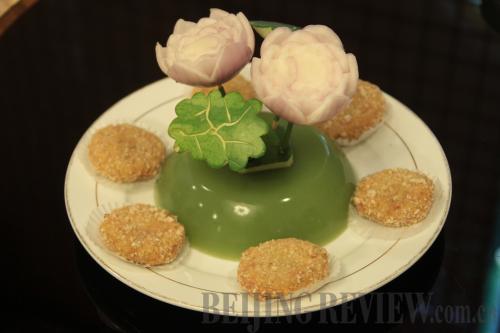|
 |
|
PHOTO BY WANG XIANG |
North Africans like their tea minty, Egyptians serve their tea sweet, and the Maris have been drinking tea for the last 1,000 years. In China, tea's discovery can be traced back 4,700 years. Like in many African countries, drinking tea is an important part of Chinese culture.
The perfect combination
Liu Qiuping runs Qiuping Tea Cuisine Restaurant, the first tea cuisine restaurant in Shanghai. Just as its name implies, tea cuisine is about cooking with tea. The simplest method is using teas like green tea, favored for its color and flavor, as a primary ingredient in dishes. But real tea cuisine doesn't include actual tea in a dish, it integrates its essence. "We add their virtues to different dishes so that customers can taste tea flavors in every dish," Liu told ChinAfrica.
Traditionally, Chinese cuisine uses cooking wine, the five spices (prickly ash, star aniseed, cinnamon, clove and fennel), peppers and cassias to mask fishy smells and oiliness. But these flavors tend to disguise a dish's original taste. Using tea instead adds a freshness to the dish.
Tea is also used in place of monosodium glutamate and soy sauce in various dishes, and the cuisine contains little oil, sugar or salt. "Stewed black tea beef," a typical dish, marinates meat with tea, which leaves the beef flavorful and tender.
Mr. Zhang is a customer at Liu's restaurant. "I've always thought tea as something only for drinking, but this tea cuisine is not just food, it's like a picture," he explained enthusiastically.
As delicious and healthy tea cuisine is, it's not easy make. Chefs are required to fully understand properties in different types of tea. Teas contain many microelements that aid in health, and how to harness these in cooking is a key concern.
Recreating braised fish with soy sauce, a dish whose taste mainly derives from the mixture of soy sauce, vinegar and white sugar, was especially challenging for Liu. In the beginning when she tried pouring tea into fish broth, she found that the soup instantly turned black. After several similar tests, Liu realized that tea couldn't be mixed with acid foods. Now when making "tea fish," she uses tea to remove the smell but avoids adding it when cooking the fish. "We are trying to achieve a perfect combination [between fish and tea]," she explained.
|